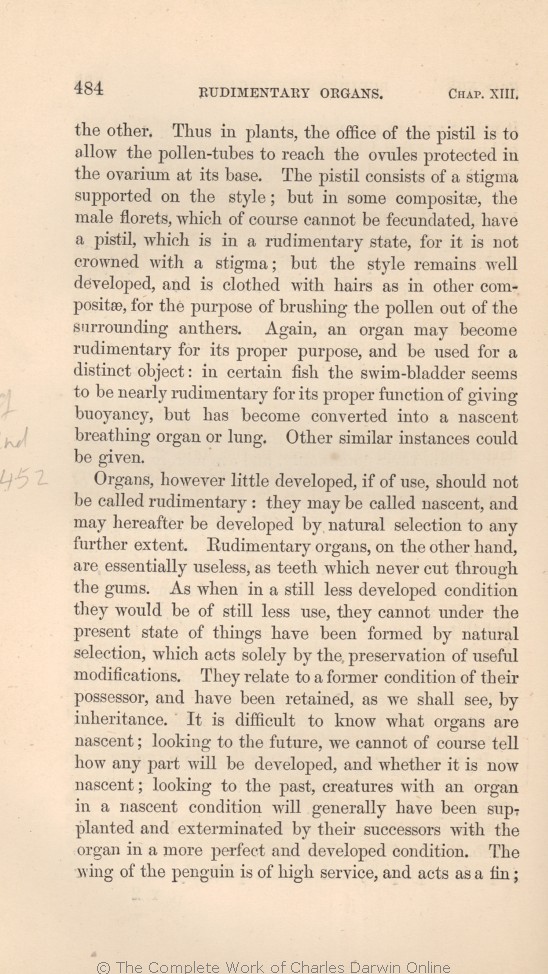the other. Thus in plants, the office of the pistil is to allow the pollen-tubes to reach the ovules
protected in | protected in 1859 1860 1861 1866 | | within 1869 1872 |
| ovarium 1859 1860 1861 1866 | | ovarium. 1869 1872 |
| at 1859 1860 1861 1866 | at 1869 1872 |
| its 1859 1860 1861 1866 | its 1869 1872 |
| base. 1859 1860 1861 1866 | base. 1869 1872 |
| the 1859 1860 1861 | | its 1866 | | a 1869 1872 |
| compositæ, 1861 1866 | | Compositæ, 1859 1860 1869 1872 |
| pistil, which is in a rudimentary state, 1859 1860 1861 1866 |
| rudimentary pistil, 1869 1872 |
| developed, 1859 1860 1861 1866 1869 | | developed 1872 |
| with hairs as in other compositæ, for the purpose of brushing 1859 1860 1861 1866 |
| with hairs, in the usual manner, for brushing 1869 |
| in the usual manner with hairs, which serve to brush 1872 |
| anthers. 1859 1860 1861 |
| and conjoined anthers. 1866 1869 1872 |
| object: 1859 1860 1861 1866 1869 | | one: 1872 |
| fish 1859 1860 1861 1866 1869 | | fishes 1872 |
| swim-bladder 1859 1860 1861 1866 | | swimbladder 1869 | | swim bladder 1872 |
| nearly rudimentary 1860 1861 1866 1869 | | rudimentary 1859 1872 |
| Other 1859 1860 1861 1866 1869 | | Many 1872 |
|
Organs, | Organs, 1860 1861 1866 1869 | | Useful organs, 1872 |
| developed, if of use, should not be called rudimentary: they 1861 1866 |
| developed, if of use, should not be called rudimentary; they cannot properly be said to be in an atrophied condition; they 1860 |
| developed, if of use, should not be considered as rudimentary: they 1869 |
| they 1872 |
| called nascent, and may hereafter be developed by natural selection to any further extent. 1861 1866 1869 |
| called nascent, and may hereafter be developed to any extent by natural selection. 1860 |
| developed, unless we have reason to suppose that they were formerly more highly developed, ought not to be considered as rudimentary. They may be in a nascent condition, and in progress towards further development. 1872 |
| organs, 1860 1861 1866 1869 1872 | | organs 1859 |
| on 1860 1861 1866 1869 1872 | | in 1859 |
| other hand, are essentially useless, as teeth which never cut through the gums. 1861 1866 1869 |
| individuals of the same species are very liable to vary in degree of development and in other respects. Moreover, in closely allied species, the degree to which the same organ has been rendered rudimentary occasionally differs much. 1859 |
| other hand, are essentially useless, as teeth which never cut through the gums; in a still less developed condition, they would be of still less use. 1860 |
| other hand, are either quite useless, such as teeth which never cut through the gums, or almost useless, such as the wings of an ostrich, which serve merely as sails. 1872 |
| 1 blocks not present in 1859 1860 1861; present in 1866 1869 1872 | | As they would be of even less use, when in a
still less developed
condition, they cannot
have
been formed
through variation and
natural selection, which latter
acts solely by the preservation of useful modifications.
|
| relate to a former condition of their possessor, and 1861 |
| cannot, therefore, under their present condition, 1860 |
| OMIT 1872 |
| retained, as we shall see, by 1861 |
| formed by natural selection, which acts solely by the preservation of useful modifications; they have been retained, as we shall see, by 1860 |
| partially retained by the power of 1872 |
| inheritance. 1861 | | inheritance, 1860 1872 |
| ..... 1861 | | relate 1860 1872 |
| ..... 1861 | | former 1860 1872 |
| ..... 1861 | | condition 1860 | | state 1872 |
| ..... 1861 | | their possessor. 1860 | | things. 1872 |
| is 1860 1861 1866 1869 |
| is, however, often 1872 |
| know what organs are nascent; 1861 1866 1869 |
| know what are nascent organs; 1860 |
| distinguish between rudimentary and nascent organs; 1872 |
| looking to the future, we cannot of course tell how any part will be developed, and whether it is now nascent; looking to the past, creatures with an organ in a nascent 1860 1861 |
| looking to the future, we cannot of course tell how any part will be developed, and whether it is now in a nascent condition; looking to the past, creatures with an organ in a nascent 1866 |
| looking to the future, we can- not of course tell how any part will be developed, and whether it is now in a nascent condition; looking to the past, creatures with an organ in this 1869 |
| for we can judge only by analogy whether a part is capable of further development, in which case alone it deserves to be called nascent. Organs in this 1872 |
| generally 1860 1861 1866 1869 |
| always be somewhat rare; for beings thus provided will commonly 1872 |
| and exterminated 1860 1861 | and exterminated 1866 1869 1872 |
| organ 1860 1861 | | same organ 1866 1869 1872 |
| and developed condition. 1860 1861 |
| and developed condition, and consequently will not now exist. 1866 |
| state, and consequently will have become long ago extinct. 1869 1872 |
| and acts 1860 1861 | | acting 1866 1869 1872 |
|









